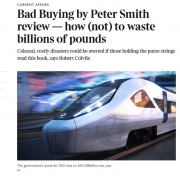Why You Should Think About Committing Fraud
I’ve read about a couple of procurement-related frauds in the media in recent days. They go to show that there is very little new in this game – both rely on tried and tested techniques, and both really would not have happened if some basic controls had been in place.
Accountant Jeffrey Bevan stole £1.7 million by making 50 fake payments to himself when he was payments manager for the accountant general of Bermuda (the islands equivalent of a finance minister). The payments were presumably disguised as going to “suppliers” and he spent the money on cars, multiple properties and gambling. He was sent to jail in 2018 but was back in court recently having been released, hence the news reports last week. A proceeds of crime hearing is trying to recover more of the stolen money from his pension, which Bevan claims is unfair.
This type of fraud is not unusual and there are several examples in the Bad Buying book. This case again shows that the perpetrator can be anyone, including senior managers, accountants, head teachers, NHS directors … In fact, it is generally more senior people who have the power to authorise payments, or to choose suppliers, so of course they are more likely to commit fraud.
But the mitigation of this risk is pretty straightforward. All payments (other than the very smallest) should be authorised by more than one person. Any new “supplier” must be checked out to make sure the organisation is genuine – and not owned by the person making the payment! Bank details should be checked and again more than one person should be involved in authorising new payment details or changes to details. This is all common sense really, yet many organisations don’t follow the basic principles.
The second case featured a senior engineering manager for Coca-Cola Enterprises UK, Noel Corry (it actually hit the news a few months back but I missed it at the time). His role included identifying electrical contractors for bottling plants across the UK, but in some cases he handed out contracts to favoured suppliers where no actual work was ever undertaken.
He took more than £1.5 million in backhanders from the firms as well as getting season tickets for Manchester United. The judge didn’t send him to jail, saying he had suffered enough (my little joke there). Actually, he was spared jail, which seems rather lucky, being given a suspended sentence. Two executives from the supplier side were also given similar sentences.
Corry ensured that work went to various companies including Boulting Group Ltd, Tritec Systems Ltd and Electron Systems Ltd in return for large sums of money paid directly or indirectly to him. The prosecuting QC said, “‘Mr Corry had the power to award general contracts directly or through a tender process. He would determine which work needed to be done and by whom… Mr Corry would ensure that companies were awarded genuine CCE contracts at inflated rates or contracts were raised in their names for bogus work never intended to be completed. The companies would invoice and then be paid. The extra money generated created a slush fund held on behalf of Noel Corry”.
Again, we see a single individual with too much power to make decisions. In this case, the fraud involved awarding contracts as well as making dubious payments. But where was the procurement function in all this? Was there no check on why and how these firms won the work? And in terms of paying for work that was not even delivered, that comes back to having multiple sign-off on invoices, so someone could have asked what exactly had been done for the money being charged.
So do check that your organisation is not open to these or other basic procurement-related frauds. Get a group of your most creative colleagues together, peple who do also know a bit about your organisations processes and systems, and ask them to “think like a crook”. How would they extract money from your organisation? Where are the weak spots in your processes, checks and controls? Most organisations do still have such issues; so it is up to procurement (and finance) leaders to find them before the criminals do – and close those loopholes!










Leave a Reply
Want to join the discussion?Feel free to contribute!